Featured Topics
Featured Products
Events
S&P Global Offerings
Featured Topics
Featured Products
Events
S&P Global Offerings
Featured Topics
Featured Products
Events
S&P Global Offerings
Featured Topics
Featured Products
Events
Language
Featured Products
Ratings & Benchmarks
By Topic
Market Insights
About S&P Global
Corporate Responsibility
Culture & Engagement
Featured Products
Ratings & Benchmarks
By Topic
Market Insights
About S&P Global
Corporate Responsibility
Culture & Engagement
S&P Global — 15 Sep, 2020
By S&P Global
A flurry of corporate mergers and acquisitions has seemingly heightened investor confidence and sent equities markets rallying after the tumult of recent weeks.
California-based biopharmaceutical company Gilead Sciences, known for its drug Remdesivir that has been used to treat COVID-19 patients, announced Sept. 13 that it will acquire cancer-drug maker Immunomedics. The Morris Plains, N.J. company received accelerated approval from the U.S. Food and Drug Administration in April for its metastatic triple-negative breast cancer drug Trodelvy, which Gilead is capitalizing on to expand its focus on cancer treatments. The deal has a reported value of $21 billion and a total transaction value of $19.9 billion to account for assumed liabilities, marking a 108% premium on the perceived value of the medicine already approved by regulators, according to S&P Global Market Intelligence.
ByteDance granted the enterprise software giant Oracle the bid for its popular video-sharing platform TikTok, passing over Microsoft’s offer and setting up the deal as a technology partnership rather than a sale of the China-based company’s U.S. operations. President Donald Trump had previously objected to a U.S. company purchasing a minority stake and operating as a technical partnership. Both Oracle and U.S. Treasury Secretary Steve Mnunchin confirmed on Sept. 14 that the Committee on Foreign Investment would review the deal this week, ahead of President Trump’s Sept. 20 deadline to close the acquisition.
“Global equities are kicking this week off on the front foot, as Asian stocks started in the green while S&P 500 futures 1% jumped in pre-market trading. Top of the tape, Oracle has struck a deal to purchase Tik Tok’s U.S. operations, which could help cool tensions between Washington and Beijing,” Chris Bennet, a director of index investment strategy at S&P Dow Jones Indices, said in a Sept. 14 note. “This deal will allow Oracle to dip its toes into the social media data-capture and monetization space that has lifted many of its competitors.”
"I would say Oracle is better-positioned politically than even Microsoft, given [Oracle CEO Larry Ellison's] very vocal and open support of Trump," Daniel Elman, a technology analyst at Nucleus Research, said in a Sept. 14 Market Intelligence interview. "There are still many political hurdles attached to this entire situation, but if anyone has a chance to successfully navigate these, I would say Oracle is a good bet."
Japanese multinational conglomerate Softbank announced Sept. 13 that it will sell British consumer chip-manufacturing company Arm to the U.S. computer game company Nvidia. The purchaser will pay $21.5 billion in shares and $12 billion in cash—including $2 billion payable at signing. The deal, worth $40 billion in total, is likely to draw antitrust concerns and has already provoked calls from the U.K. government for Arms to protect the 3,000 jobs it creates in Britain.
On the back of the M&A announcements, the S&P 500 rallied by 1.27%, the Dow Jones Industrial Average climbed roughly 328 points, or 1.18%, and the Nasdaq Composite rose nearly 2% at the market close on Sept. 14.
At the end of last month, the S&P 500 Information Technology sector—which makes up 28.7% of the benchmark equities index— had rallied 36% across the previous 12 months, according to S&P Dow Jones Indices.
Today is Tuesday, September 15, 2020, and here is today’s essential intelligence.
Gilead Pays 108% Premium for Commercial Cancer Foothold with $21B Deal
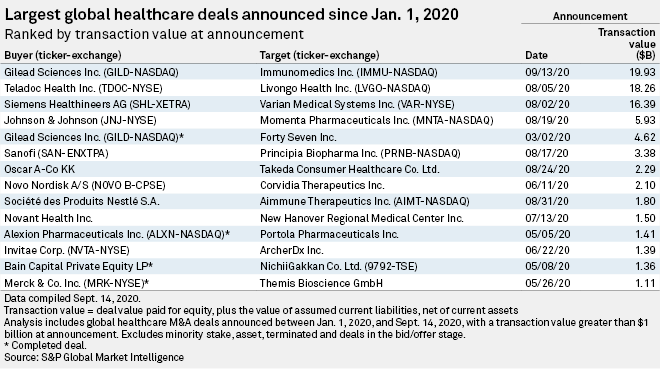
Gilead Sciences Inc.'s planned $21 billion acquisition of cancer-drug maker Immunomedics Inc. — the largest healthcare deal announced in 2020 so far — comes with a 108% premium that underscores the perceived value of a medicine already approved by regulators. "The two immediate things that jump out here are the perhaps larger than expected dollar price tag and the percent premium," Mizuho Senior Biotech Analyst Salim Syed said in a Sept. 14 note. "However, the acquisition also gives Gilead the chance to increase its top-line in a meaningful way, and this is likely what the stock eventually needs to work."
—Read the full article from S&P Global Market Intelligence
Default, Transition, and Recovery: Global Corporate Defaults Pick Up After Slowing In August
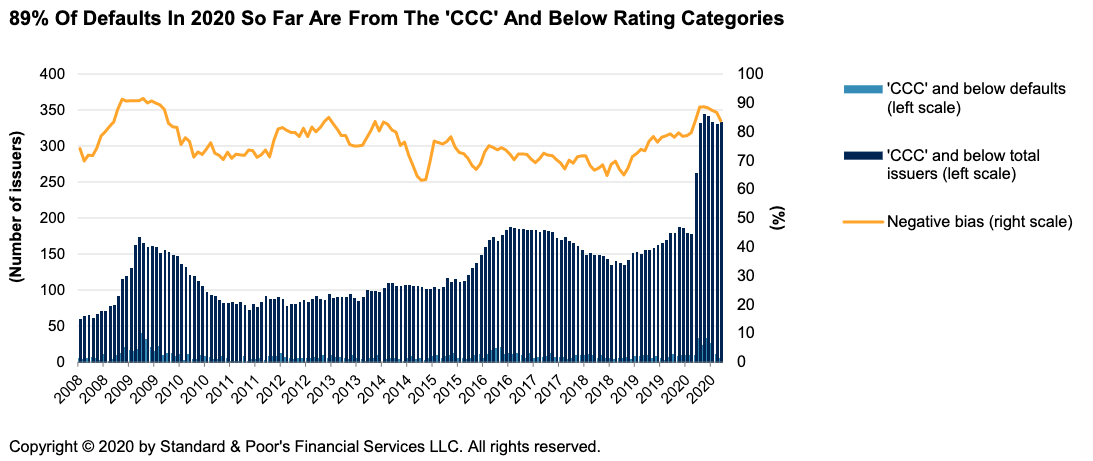
After no defaults in the prior week, five issuers have been added to the default tally this week. So far in 2020, 152 out of 171 defaults (or nearly 90%) were from entities rated 'CCC' and below before default, illustrative of the high default risk for this part of the ratings spectrum. Although down slightly from the March peak of 89%, 84% of 'CCC' and below ratings have negative outlooks or are on CreditWatch with negative implications, indicating at least a one-third chance of a downgrade over the next year.
—Read the full report from S&P Global Ratings
European Theater Chains Could Monetize Assets Amid COVID Slump – Analysts
Having secured their short-term survival, AMC Entertainment Holdings Inc. and Cineworld Group PLC could sell or list select European movie theater operations to boost cash reserves amid long-term disruption to ticket sales from the coronavirus pandemic, according to analysts. The majority of theaters in Europe have reopened following local lockdowns, though caps on capacity range from 15% to 50%. Factors impacting attendance also include delays to film releases and customer wariness as COVID-19 cases rise again in several European markets.
—Read the full article from S&P Global Market Intelligence
"Where Do We Go From Here?": Highlights From S&P Global Ratings' 2020 European Structured Finance Conference
On Sept. 3, 2020, S&P Global Ratings hosted its third annual conference on European structured finance, this time in virtual format. The event featured presentations and interactive panel discussions, led by S&P Global Ratings’ analysts and comprising key market participants, including investors, originators, and arrangers. In his keynote address, S&P Global Ratings’ Chief Economist, Paul Gruenwald, updated delegates on the global macro outlook.
—Read the full report from S&P Global Ratings
Transcript: Coronavirus Insights - An Outlook on Corporate Credit Risk and IFRS 9 Implications
On the 25th of August 2020, S&P Global Market Intelligence hosted a webinar on the impact of COVID-19 on corporate credit risk and International Financial Reporting Standard 9 (IFRS 9) implications. Read the full transcript and discover which industries have been the most and least impacted from a probability of default (PD) perspective, sector level impact and credit recovery for rated entities, what to consider when looking at the macro-economic factors and the impact on point-in-time PDs for IFRS 9 calculations plus, many more insights.
—Read the full article from S&P Global Market Intelligence
Bank M&A 2020 Deal Tracker: 9 Deals Announced in August
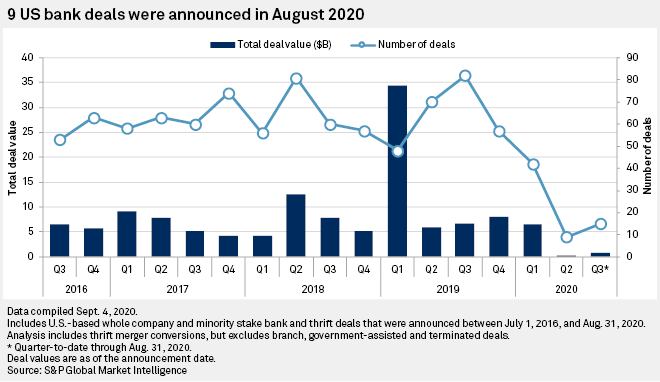
U.S. banks and thrifts announced nine deals in August as M&A activity started to slowly pick up pace following the initial onset of the coronavirus pandemic. During the first eight months of 2020, the industry saw 66 deal announcements with an aggregate value of $7.44 billion, compared to 173 deals worth $45.09 billion in the same period of 2019. The median deal value to tangible common equity ratio for deals announced in 2020 was 136.3%, down from 157.7% in all of 2019.
—Read the full article from S&P Global Market Intelligence
Historical Virtues Do Not Shield European Cooperative Banking Groups From Disruption
As with their commercial bank peers, cooperatives are facing unprecedented challenges and their unique organizational and ownership structure will not necessarily save them from demise. S&P Global Ratings believes their survival will depend on how their business and operating models adapt to changed client preferences and competitive trends in the digital age. S&P Global Ratings expects their ratings on most groups to continue to be buttressed by their focus on long-term stability over short-term returns, and typically high capital levels.
—Read the full report from S&P Global Ratings
Down To Three, U.S. Wireless Industry Enters A Period Of Uncertainty With A New T-Mobile And 5G Investments
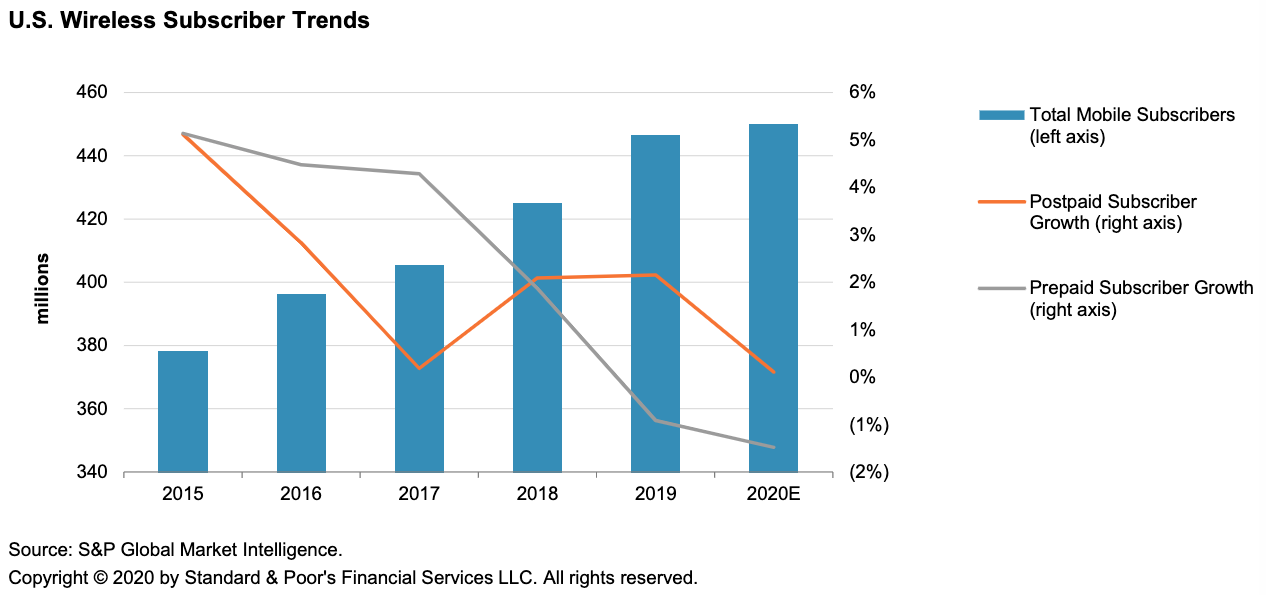
Despite the pandemic and economic recession, S&P Global Ratings expects the U.S. wireless industry will hold up reasonably well relative to other corporate sectors. With industry consolidation, we believe competitive intensity should be relatively steady over the next couple of years as T-Mobile embarks on its integration of Sprint. However, there is still a lot of uncertainty. Assuming a successful integration, T-Mobile has an abundance of spectrum, and has the marketing prowess to aggressively take share. At the same time, new competition from cable and DISH could constrain top line and margin improvement.
—Read the full report from S&P Global Ratings
Not Your Father's Tech Sector
As of the end of August 2020, the S&P 500® Information Technology sector had risen a remarkable 36% over the past 12 months. Such outstanding relative performance of course reminds us of the late 1990s, when the markets experienced a technology bubble and subsequent bust. One notable resemblance to the late 1990s is Information Technology’s weight in the S&P 500. Information Technology makes up 28.7% of the S&P 500 today, and its weight hasn’t been this high since August 2000, when IT was 33.6% of the index.
—Read the full article from S&P Dow Jones Indices
US Risks Green Tech Leadership as Europe Makes Play with COVID-19 Stimulus
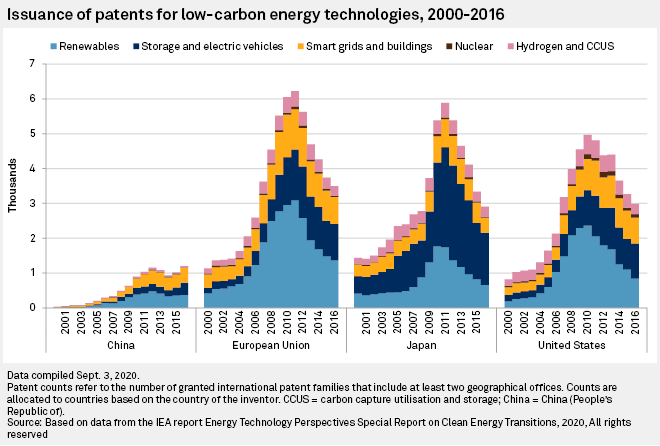
On the list of countries unveiling green fiscal stimulus policies in recent months there is one glaring omission. Despite unleashing $3 trillion of measures to tackle the economic consequences of the coronavirus, the U.S. federal government has channeled just 1.1% toward initiatives that could help its transition to a more environmentally sustainable economy, according to Rhodium Group.
—Read the full article from S&P Global Market Intelligence
EU Must Act on Growth in Coal-based Electricity Imports: Eurelectric
The EU must level the playing field on imports of unabated coal-based electricity from third countries, industry association Eurelectric said in its annual Power Barometer report Sept. 14. The report shows a steep growth in electricity imports over the last five years, to over 20 TWh in 2019 from 3 TWh in 2015. "Due to lax energy and climate regulations, the average CO2 intensity of this imported electricity is two to three times higher" than that produced in Europe, it said.
—Read the full article from S&P Global Platts
BP Warns Oil Demand May have Peaked as Pandemic Hits Fossil Fuels
Global oil demand may have already peaked, according to BP's latest long-term energy outlook, as the COVID-19 pandemic kicks the world economy onto a weaker growth trajectory and accelerates the shift to cleaner fuels. Demand for oil will be the biggest casualty over lower energy demand in the coming three decades as weaker economic growth and a faster shift to renewable energy accelerates the demise of oil-based transport fuels, BP said its Energy Outlook 2020 published Sept. 14.
—Read the full article from S&P Global Platts
UAE's Abu Dhabi to Produce 1/3 of Power From Clean Energy in 4 Years
Abu Dhabi, the oil-rich emirate in the seven-member UAE federation, plans to generate a third of its power from clean energy, including nuclear reactors, in four years, a government official told S&P Global Platts, as the country diversifies its energy mix and frees up oil and gas for export. Abu Dhabi, which sits on most of the UAE's oil and gas resources, is forging ahead with its renewable and nuclear power projects despite delays from the COVID-19 outbreak. The emirate has been making headway in solar projects after its 2 GW al Dhafra solar project achieved a then-record low tariff of 1.35 US cents/kWh in April.
—Read the full article from S&P Global Platts
California's Rolling Blackouts Could Foreshadow Rating Pressures For Public Power And Electric Cooperative Utilities
Recent rolling blackouts across California highlight the potential for operational and financial challenges for electric utilities in that state and elsewhere as they embrace intermittent renewable resources. Although many states have introduced carbon-free mandates, the targets could be overly ambitious because achieving some elements of the decarbonization frameworks might not be feasible.
—Read the full report from S&P Global Ratings
NextEra, Southern Report Largest CEO to Median Employee Pay Ratios in 2019
NextEra Energy Inc. and Southern Co., home to two of the highest-paid utility executives in the U.S., also reported the largest CEO to median employee pay ratios in 2019. The SEC in 2017 implemented a rule that required companies beginning in the 2018 proxy season to disclose the annual compensation of their median employee and the ratio between that individual's pay and the CEO. The initial pay ratio disclosures were based off full-year 2017 compensation.
—Read the full article from S&P Global Market Intelligence
Market Movers Americas, Sep 14-18: Naphtha Arbitrage Opens, USGC Diesel at Six-Month High

In this week's Market Movers Americas, presented by Nicole Baquerizo: naphtha arbitrage opens on low clean freight; USGC diesel eyes refinery returns with six-month highs; RBOB backwardation collapses as demand outlooks dim; and corn and soybean yields drop in WASDE.
—Watch and share this Market Movers video from S&P Global Platts
Is Global Offshore Drilling Sunk?
The offshore drilling industry continues to be under tremendous stress and S&P Global Ratings expects market conditions to remain difficult for the next several years, particularly for deepwater drilling. Seven of the nine global offshore drilling companies Ratings rated at the beginning of the year have either filed for Chapter 11 bankruptcy protection, completed a distressed exchange, or will likely file or restructure within the next few quarters.
—Read the full report from S&P Global Ratings
OPEC Cuts Demand Forecasts as US, Canada Supply Recovers
OPEC has turned more bearish on the oil market's recovery from the coronavirus crisis, forecasting a more sluggish global economy and rising production from the US, Canada and Brazil, a month after the bloc and 10 allies eased their record cuts. OPEC on Sept. 14 issued its latest oil market forecast, revising down its projection of global demand by 400,000 b/d for 2020 and by 770,000 b/d for 2021. At the same time, non-OPEC supply is expected to increase more than the organization had previously forecast. The global economic growth estimate was lowered to minus 4.1% for 2020 from minus 4%.
—Read the full article from S&P Global Platts
OPEC's Barkindo sees China as bright spot in challenging demand scenario
Oil demand growth in China is currently the only certainty, with consumption in the country seen rising through the remainder of 2020 and recovering completely in 2021, but the rest of Asia will not see a full recovery to pre-crisis levels during 2021, OPEC Secretary General Mohammed Barkindo told S&P Global Platts. "In the September edition of OPEC's Monthly Oil Market Report, we have caveated all of our forecasts by stressing the fact that the current outlook is very uncertain," Barkindo said in a written interview to Platts ahead of the 36th Asia Pacific Petroleum Virtual Conference over Sept. 14-16.
—Read the full article from S&P Global Platts
COVID-19 puts brakes on oil demand, jet fuel recovery to lag - Vitol execs
The global coronavirus pandemic has caused a massive dent in global oil demand, with the transportation sector, particularly the aviation industry's jet fuel demand most severely affected and its recovery expected to lag that of other oil products, Vitol's CEO, Russel Hardy, said Sept. 14. "There's nothing really in history that compares to the absolute slowdown in oil demand that occurred in March-April and the result of that was around 1.2 billion barrels of build in oil stocks," Hardy said during an interview session at the 36th Annual Asia Pacific Petroleum Virtual Conference.
—Read the full article from S&P Global Platts
Will the White House vote move the US oil production outlook?
How much will November's presidential election actually influence the outlook for US oil and gas production? Artem Abramov, head of shale research for Rystad Energy, makes the somewhat contrarian case that whoever is in the White House come next year will not greatly sway US production either way. Rystad predicts a federal drilling ban, as proposed by Democratic presidential nominee Joe Biden, would have hardly any impact on oil and gas production in the medium term, given drillers' ability to shift to comparable private acreage.
—Listen and subscribe to Capitol Crude, a podcast from S&P Global Platts
Written and compiled by Molly Mintz.
Content Type
Theme
Location
Language